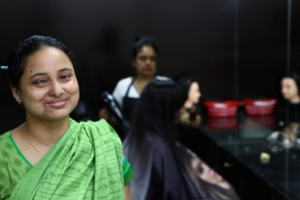

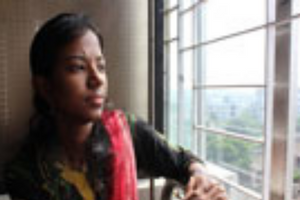
Popy Rani Das
A Flower That Will Never Die
Whether it is the best Thai cuisine in town, the roadside fuchka or simply mother’s home-cooked dinner, we all have our periodical cravings for our favorite food. Such was the case for 21-year-old Popy Rani Das, until she took a leap into the wrong direction in life. The malicious trap of marriage seized not only a little happiness that remained in Popy’s life but also her ability to eat and drink her to satisfy her taste buds. Prior to her birth, her parents had filed for a divorce and her father passed away when she was only 5 years of age. Like many other rural areas in Bangladesh, young-aged marriages have been the popular culture in Kishoreganj too. In January 2009 at the age of 21, as a medical technician at Jahirul Islam Hospital in Gazipur, Popy got married to a young goldsmith named ProdipBanik. Banik, hungry for dowry would abuse his wife day in day out. Within 8 months, their marriage had gone sour.
On September 7, 2009, Popy, who had been suffering of a severe fever, had simply requested her husband for a glass of water. The egregious acts that followed, is beyond justifiable. Taking a gulp from the glass of water that she had thought would appease her thirst and save her life had in reality been a gulp into acid that demolished her life. At consumption, an instantaneous sensation of uneasiness ran down Popy’s esophagus. Unsure of the situation and consequences, Popy gradually lost consciousness. At the news of her unconsciousness, her beloved mother and aunt did not pay much attention believing that it was simply a consequence of her fever. Only after three days had passed, her mother, overwhelmed by the realization of what had happened, took her to the Jahirul Islam Hospital, where she as an employee, received free treatment.
Soon after, she moved to the Acid Survivors Foundation where she, till date continues to receive free-of-charge treatment as well as accommodation. In dismay, Popy says, “This feeling of perpetual thirst cannot be quenched; I cannot drink water.” 1 A completely burnt throat and esophagus has left Popy to depend on mashed food provided to her through an incision made in her abdomen. Through an education initiative that ASF had taken on board after the termination of her treatment, Popy was enrolled into grade 9 under the Open University, spending a total of BDT 30, 000 as IGA support. This effort, however, became a futile attempt as a result of physician’s recommendation that Popy remains at ASF and refrained from movement due to her incision. This has also imposed a social barrier on Popy, acting as an interruption in terms of engaging in proper employment despite her expertise in sewing, handicrafts and henna art. Her excellence and talent in this field have permitted her to be serving as the trainer and instructor of the Sewing and Handicrafts training sessions for the fellow survivors, which is organized under the Income Generating Project at ASF, through the financial contributions made by the King Baudouin Foundation, a Belgium based Donor Agency.
As an artistic individual Popy has also excelled in the music and art therapy sessions that she receives at ASF. The post-incident trauma that Popy had encountered along with the additional burden of societal discrimination had made it an arduous process for her to be accepting of the situation. Nonetheless, Popy has shown a positive response to the therapy sessions and has made notable progress in terms of physical health and psychological conditions.
Marital life is often associated with affection and pleasure, yet for many individuals, such as Popy, that life has taken such a bearing on the prosperous future they could perhaps be living, that there is no turning back. Popy does not long for an opulent life; the fight for survival remains the greatest fight in her life. For further treatment it is essential for Popy to travel to Australia, however, the exorbitant costs that are entailed with her case have
acted as a hitch to further progress. As a further encumbrance to Popy’s case, a lack of prompt action by the police despite a lawsuit being filled, Banik has left to freely wander the streets, perhaps as a potential threat to many other women and a motivation to many such men.
Acid abuse cases, in regards to the failure of fulfilling dowry requirements or simply a refusal to relationship advancements, have been very common in Bangladesh. The high number of incidents like Popy’s is most remorseful, as the perpetrators are not held accountable for their sinful and heinous actions. Little to no interest on behalf of the authoritarian bodies has left this nation as an open invitation for such crimes to continue.
We the people, along with the policymakers and other authoritarian bodies of Bangladesh, must take a stand against the perpetrators and put an end to this battlefield; to make all our citizens feel protected and sheltered within the borders of their own motherland.
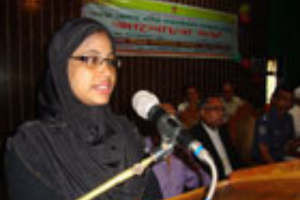
Mihila Alam Mila
Mila’s journey from ‘victim’ to ‘survivor’
Alam Promanik lives with his family of five in Malinagar village, Bogra district and Mihila Alam Mila is his second daughter. Her father was struggling to make ends meet and at the same time ensure with great difficulty that his children continued their education. Mila was 17 years old and preparing to sit for her S.S.C examination when she received a marriage proposal. Impoverished Alam did not want to miss an opportunity to settle his daughter’s life and so on the afternoon of 14th July 2006, young Mila was married to 26 year old Shahidul from the local village of Shikarpur.Mila’s father gave his new groom all the furniture that was needed for their home as a wedding present. But even before the year ended, Mila’s in-laws demanded dowry and began to harass her. But Mila’s father was too poor to fulfill the demands for dowry and as a result the girl’s harassment worsened day by day. Witnessing the dire state of his daughter, in an attempt to free her from these circumstances Mila’s father was forced to sell their milk cow and take out a loan. He managed TK 115,000 to quench the greed of Mila’s husband and in-laws. However, only a little time passed before her husband and his family again began to pressure Mila for dowry. This time Mila was determined to not take any more money from her father. During this Mila also became pregnant and in 2006 she gave birth to a baby boy. She had hoped that after seeing their grandson her in-laws
would not have the heart to demand dowry. This was not the case and the harassment progressively grew worse. Mila reached a point where she could no longer bear the harassment and left with her child to her father’s home. Her father having had enough of Shahidul’s cruel behavior decided to file a case under Women and Children Repression Prevention Act 2000.
Even though Shahidul was arrested because of the case, he was released on bail only a few days later. Now along with the demand for dowry, Shahidul was angry about the case filed against him and he continued to harass Mila. He threatened to take the life of both Mila and her child.
Thus Mila was forced to file for divorce from her husband. At this time Mila started a job as a maid at Ismaili hospital to support herself and her son. One night as she was returning home after her shift, Shahidul along with some others followed her and threw acid on Mila. It was the 9th of August 2010. The acid burned Mila’s shoulders, stomach and the lower part of her body severely. Hearing Mila’s scream of pain her neighbors rushed to her aid and together arranged to pour water on her burns. They urgently took her to Ismaili Hospital and then to Mohammad Ali Hospital. After receiving first aid treatment, Mila with the help of ASF’s local partners Lighthouse and Brac was brought to ASF hospital in Dhaka. At ASF, Mila went through almost one and half months of continuous treatment which included two operations.
When recalling the incident of the acid attack, Mila says that neither she nor her family had even hoped that she would be alive today. Even if had expected to live, she had imagined a life where she would have to live with severe disabilities and great despair and sadness. She thought she would live a life where she would have to depend on people’s kindness and sympathy. But all these anxieties have been proven wrong by ASF.
Through the treatment provided by ASF, Mila was slowly improving physically and also undergoing routine physiotherapy sessions to regain her functional ability. At the same time, ASF’s psychological and social unit arranged for 5 counseling and 2 psychotherapy sessions to help Mila overcome the trauma and reclaim her courage. On 17th September 2010, Mila left ASF to return home.
Immediately after the incident had occurred, Mila’s mother Fatema Begum with legal help from Brac began the proceedings under an acid crime tribunal Shahidul Haque along with his accomplices, Mila’s brother-in-law Shafikul Islam and sister-in-law’s husband Majedur Rahman were all named in the charges. After this tragedy befell Mila her father became ill and bedridden. Her father’s bedridden and disabled state along with the threats
that came from the perpetrators made it very difficult for Mila to remain in her house. At this stage, with the help of Lighthouse Mila was placed in Ain O Shalish Kendro’s shelter house in Dhaka. Light House also arranged quite a few talks and press conferences to lobby for the arrest of Shahidul. As a result, the police arrested the number one suspect of the crime Shahidul Haque on 26th August 2011.
However, the other two accomplices have yet to be arrested and at the moment the case is in proceedings. Almost nine months later when things returned to normal, Mila was able to go back home. But the costs of the case, the bedridden state of her sick father amongst other things had caused Mila’s family to fall into a state of economic despair. ASF with the help of Light House tried to ensure that Mila continued to act with strength and courage upon returning home. ASF and lighthouse arranged three community clinics to sensitize Mila’s community on the difficulties that acid victims may face when returning home and how the community can help the victims overcome these difficulties. Light House also made five house visits to follow up on Mila’s progress. In October 2011, ASF with the help of Light House provided Mila’s family with a milk cow worth TK 33,000 and through the local District, office got her a sewing machine. They also tried to return Mila to her previous job at the Islamia Hospital. But there was no longer an opportunity for Mila to continue working there and so they arranged a job for her as a receptionist at the Shaheen Eye Care Centre that earned her TK. 3,000 per month. Currently, selling cow’s milk along with Mila’s income has allowed her to take the lead of her family and also the responsibility of educating her younger brother. This is how Mila has proved that women do not solely object to marriage and the attainment of dowry. They too have the ability to take on society’s responsibilities. Mila wants to work for the rights of all those who are deprived and in despair as acid victims. Mila wants to rid her society of this heinous crime. She believes that if we all work together and everyone extends a helping hand with good faith, then all of our society’s acid victims will be able to raise their heads with pride. This is why this is not the end of Mila’s story but merely a glimpse into the bright future that lies ahead of her new journey.
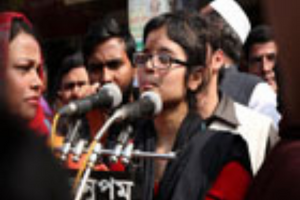
Masuda Akter Moni
Moni overcome Challenges to get Justice
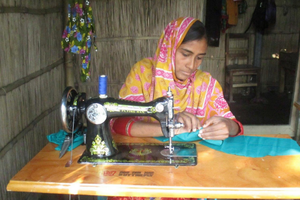
Kolpona Akter
A woman of courageous surviving attitude
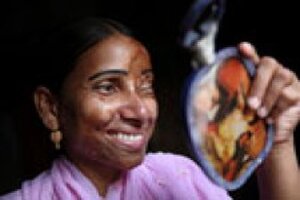
Asma Full Story
Asma- An Inspiration for All
Asma is from a remote village in Bangladesh. In her village, a maximum of girls drop out of school at the primary level. One of the reasons for the high dropout rate is because students have to walk a mile, cross a river and then walk another mile to attend the local high school. Asma was the only girl in her village who was attending high school. When Asma was in high school a local man used to stalk Asma after school and he expressed his desire to marry her. Asma and her family rejected the marriage proposal because they did not approve of the man after which he became furious. Asma’s father was not interested in marrying his daughter at such a young age and he had high aspirations for Asma to continue her education. Fearing for her safety Asma’s family temporary shifted her to her aunt’s house which was much closer to her school. After a few months Asma was unable to continue living at her aunt’s place due to a personal reason and she returned home. At this time Asma and her family thought that the man had lost interest in Asma and would leave her alone. But the perpetrator and his family continued to harass them and began to make threats saying “we’ll see how you continue your studies.”On August 18, 1999 at around four o’ clock in the morning, thirteen year-old Asma was sleeping in a room with her mother, brother, and three sisters. Asma’s father was at the mosque for the fajr (morning) prayer when the man who had been pursuing her sneaked into her house, shone a flashlight over her, and threw acid targeting her face. At that moment, Asma screamed, her family woke up, and the attacker attempted to exit through a side door. The door was locked and held shut with a heavy pot full of water, making his escape difficult. Asma’s brother chased him and caught him. The attacker argued with Asma’s brother, even denying that he was behind the attack when his hand showed signs of acid burn indicating that when he threw the acid some of the acid came in contact with his hand. Finally, the police came and arrested the perpetrator.
Asma suffered from severe burns that destroyed the left side of her face including her left eye. At that time, most people in her community were not aware of what to do immediately after an acid attack or how to treat the burns. Asma’s family did not pour water over her face, fearing that it might cause further damage even though Asma was crying out in pain asking for water to be poured on her face to reduce the burning sensation. Still unsure of what to do, Asma’s uncle brought a local doctor who put egg whites on Asma’s face to temporarily treat the wounds. Two hours later, Asma was taken to the local hospital by boat and was given medicine for pain relief.
She was then transferred to another district hospital, where she stayed for two weeks. It took her four hours to get there, and even there they were unfamiliar with the treatment required for acid burns.
While on the phone with someone, Asma’s father heard about the burn unit at Dhaka Medical College Hospital (DMCH). She was taken there and where she met the staff of ASF for the first time. ASF provided all the logistics for her treatment in DMCH. She first received her skin grafting after one month of her stay in DMCH. She was released from DMCH six days after surgery. Her wounds were not fully healed, but the hospital was unable to accommodate her because there were other patients waiting to be admitted. It took three hours by bus, six hours by motorboat, followed by another boat ride and a long walk before she made it home. Asma returned to DMCH after one week to get her eye checked and remained there for two months, however nothing could be done. Around this time, the Rehabilitation Unit at ASF was established. Asma was able to stay there while undergoing a few more surgeries at DMCH. With the support of ASF 7 acid survivors including Asma were taken to Spain for further treatment.
For Asma, the journey to recovery has been painstakingly difficult. Reflecting on the time following her return from Spain, Asma commented “I had no interest or desire to continue my studies because my hopes were completely shattered.”
Despite her continues struggles Asma able to refocus on her education and was determined to make a living for herself. After providing Asma with training on making pressure garment (a medical accessory which is required for the healing process of burn injuries) she was recruited by ASF. This brought some stability in her life and Asma started showing some interest to continue her education. ASF admitted her in a school and provided her with education support to pay for her school expenses including the cost of accommodation and food. Asma successfully passed her S.S.C and H.S.C examinations and was recruited as a peer educator. As a peer educator she had to work with the professional counselor to provide psychosocial support to other acid victims. Asma is married and has a three year old daughter Of course, the suffering caused by the acid attack is a part of Asma’s life, and her present-day battles cannot be ignored. Recalling the past and details of the incident can be painful. When asked what changed most in her life following the acid attack, tears began rolling down Asma’s face as she uttered, “there is no night when my pillow is not wet”.
Moreover, the effects of the acid attack are still apparent in her life outside of home. As is the case with many survivors of acid attack, Asma continues to seek justice through the grueling court process. Asma and her family filed a case against the perpetrator immediately after the incident. It took three years before he was sentenced to lifetime imprisonment without bail.
However, the perpetrator and his family brought the case to high court and are trying to appeal for a lesser punishment. They continue to threaten Asma and her family. “Since my perpetrator is suffering in prison, his whole family only has the goal of revenge…to put my father and brother in jail. And…if he‟s appealing, he might come back and we do not know what he is going to do. He is already indirectly threatening us, saying that he will do this and that when he comes back….that he‟ll kill my dad, he‟ll kill my brother. Even when I say „I‟m good, I‟m fine,‟ with all this in mind, my whole life has actually been turned upside down….the cruelty in my life started the day he threw acid on me.”
It is difficult for Asma and her family to put this traumatic incident behind them. It has been eleven years since the incident, and Asma and her family still must confront the perpetrator to keep him in jail. Asma asserted, “The justice system, what are they supposed to do? They can‟t do anything before the incident happens…whatever has been done is done. People say, „What‟s the point in giving him punishment now because what he‟s done is done?‟ But this is the only possible source of peace for us. He has at least been punished. This is my mental peace…that he‟s not any better off than me….”
And the battle with facing society still remain. Some people question if Asma could have helped prevent the attack. “Literate or illiterate societies, people mindlessly ask, „He asked you to marry him. Why didn‟t you just marry him?‟ But a person gets a lot of marriage proposals…you can‟t just marry all of them. If my dad married me off to my perpetrator, somebody else could have just as well thrown acid on me. Sometimes it hurts…people should think that I also have right to say no before they ask something.”
Though she had to face many obstacles but she says that her biggest strength that got her through the difficult time was her family “My daughter is very kind, she understands that something has happened to me, but she never asks about it. She does not make me feel bad. My own family of course does not question me about it, even my in-laws do not.” Asma also acknowledge ASF’s cooperation as a main driving force that supported her during the most crucial time of her life. “If ASF wasn‟t there then girls like me would have to face a lot of struggles. I think this is the place of peace which gives shelter to people like us.”
Her wounds were not fully healed, but the hospital was unable to accommodate her because there were other patients waiting to be admitted. It took three hours by bus, six hours by motorboat, followed by another boat ride and a long walk before she made it home.
Asma returned to DMCH after one week to get her eye checked and remained there for two months, however nothing could be done. Around this time, the Rehabilitation Unit at ASF was established. Asma was able to stay there while undergoing a few more surgeries at DMCH. With the support of ASF 7 acid survivors including Asma were taken to Spain for further treatment.
For Asma, the journey to recovery has been painstakingly difficult. Reflecting on the time following her return from Spain, Asma commented “I had no interest or desire to continue my studies because my hopes were completely shattered.”
Despite her continues struggles Asma able to refocus on her education and was determined to make a living for herself. After providing Asma with training on making pressure garment (a medical accessory which is required for the healing process of burn injuries) she was recruited by ASF. This brought some stability in her life and Asma started showing some interest to continue her education. ASF admitted her in a school and provided her with education support to pay for her school expenses including the cost of accommodation and food. Asma successfully passed her S.S.C and H.S.C examinations and was recruited as a peer educator. As a peer educator she had to work with the professional counselor to provide psychosocial support to other acid victims. Asma is married and has a three year old daughter
Of course, the suffering caused by the acid attack is a part of Asma’s life, and her present-day battles cannot be ignored. Recalling the past and details of the incident can be painful. When asked what changed most in her life following the acid attack, tears began rolling down Asma’s face as she uttered, “there is no night when my pillow is not wet”.
Moreover, the effects of the acid attack are still apparent in her life outside of home. As is the case with many survivors of acid attack, Asma continues to seek justice through the grueling court process. Asma and her family filed a case against the perpetrator immediately after the incident. It took three years before he was sentenced to lifetime imprisonment without bail. However, the perpetrator and his family brought the case to high court and are trying to appeal for a lesser punishment. They continue to threaten Asma and her family.
“Since my perpetrator is suffering in prison, his whole family only has the goal of revenge…to put my father and brother in jail. And…if he‟s appealing, he might come back and we do not know what he is going to do. He is already indirectly threatening us, saying that he will do this and that when he comes back….that he‟ll kill my dad, he‟ll kill my brother. Even when I say „I‟m good, I‟m fine,‟ with all this in mind, my whole life has actually been turned upside down….the cruelty in my life started the day he threw acid on me.”
It is difficult for Asma and her family to put this traumatic incident behind them. It has been eleven years since the incident, and Asma and her family still must confront the perpetrator to keep him in jail. Asma asserted, “The justice system, what are they supposed to do? They can‟t do anything before the incident happens…whatever has been done is done. People say, „What‟s the point in giving him punishment now because what he‟s done is done?‟ But this is the only possible source of peace for us. He has at least been punished. This is my mental peace…that he‟s not any better off than me….”
And the battle with facing society still remain. Some people question if Asma could have helped prevent the attack. “Literate or illiterate societies, people mindlessly ask, „He asked you to marry him. Why didn‟t you just marry him?‟ But a person gets a lot of marriage proposals…you can‟t just marry all of them. If my dad married me off to my perpetrator, somebody else could have just as well thrown acid on me. Sometimes it hurts…people should think that I also have right to say no before they ask something.”
Though she had to face many obstacles but she says that her biggest strength that got her through the difficult time was her family “My daughter is very kind, she understands that something has happened to me, but she never asks about it. She does not make me feel bad. My own family of course does not question me about it, even my in-laws do not.” Asma also acknowledge ASF’s cooperation as a main driving force that supported her during the most crucial time of her life. “If ASF wasn‟t there then girls like me would have to face a lot of struggles. I think this is the place of peace which gives shelter to people like us.”
